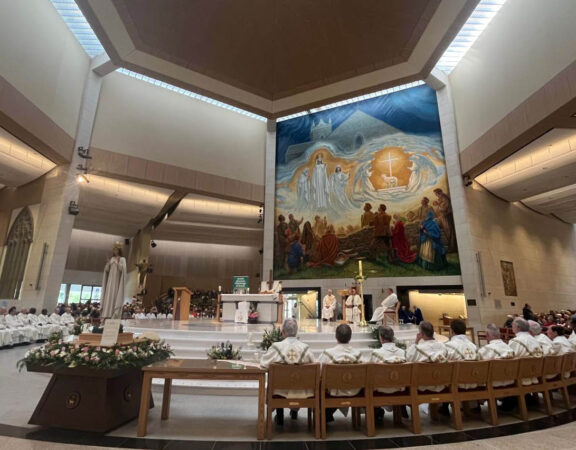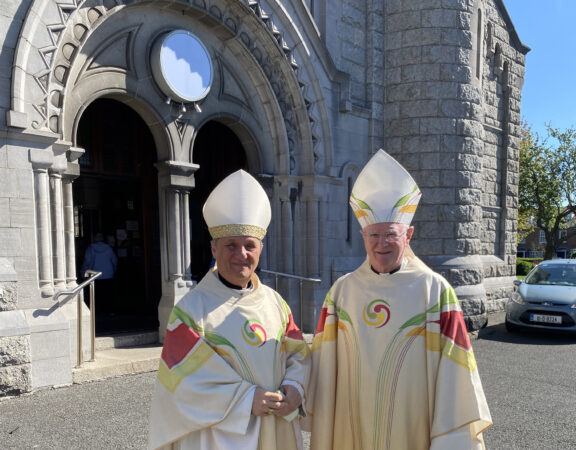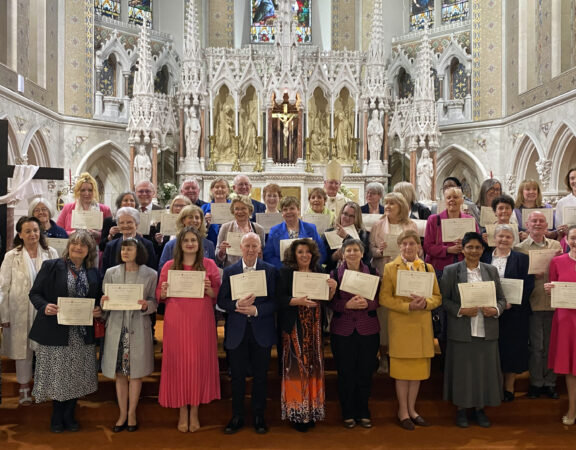National Child Safeguarding Conference
BE NOT AFRAID
Address of Most Rev. Diarmuid Martin, Archbishop of Dublin, Ormonde Hotel, Kilkenny, October 27th 2018
“Ireland is a country in constant change. No one would deny that Irish religious culture is not exempt from that change. This Conference and our daily work take place within that changing background. The recent visit of Pope Francis clearly took place in a cultural situation very different to that of his predecessor Pope John Paul II in 1979.
That was the dominant note of the words of welcome to Pope Francis that I spoke at the opening of the Mass in the Phoenix Park. “The Church in Ireland has gone through challenging times. People have been wounded in the depth of their being by Church people; people’s faith has been challenged and the Church of Jesus Christ has been wounded”.
Referring to the Papal Cross under which the Mass took place, I said: “The Cross which dominates our gathering today is a symbol. It was probably never intended to be a permanent memorial. There were times when people asked that it be removed. There were times when this Cross appeared starkly isolated in the bleakness of an Irish winter”.
My hope as we gathered around the same cross was as I said: “The hope of a spring for the Irish Church. We look towards a spring sun that does not wish to cover up the harshness of dark days. We wish rather to help families realise anew that the future of Ireland needs the light of the message of Jesus Christ to reappear in all its simplicity and hopefulness”.
The work of safeguarding in the Church in Ireland is about those three things: a recognition of the darkness, a search for renewed hope, and an awareness that the work of safeguarding and the work of the renewal of the Church belong hand in hand.
There is very strong phrase in the speech of Pope Francis to the Irish Bishops at the conclusion of his visit. He recognised how the failures of the Church had led to a sense of humiliation within the Church and an alienation of many from the Church.
Pope Francis however pointed out that we can overcome that humiliation. “Humiliation is painful, but we have been saved by the humiliation of the Son of God and this gives us courage. The wounds of Christ give us courage”.
He goes on however then with clear words to remind us that being disciples of a Jesus who suffered humiliation we ourselves can never act towards others in a triumphalist or arrogant way. He adds: “Do not repeat the attitudes of aloofness and clericalism that at times in your history have given the real image of an authoritarian, harsh and autocratic Church”.
These are very strong words but very important words. They touch the very essence of faith. Faith must be strong but faith also contains an intrinsic fragility than can steer us beyond a self-centred Church and thus away from any form of arrogance and self-centeredness.
I became Archbishop of Dublin fourteen years ago. I came back to Ireland after living abroad for over thirty years. I came at a moment in which the crisis of the sexual abuse of priests and abuse of children in Church-run institutions was at its heights.
There are some who say that I came with specific instructions to address and resolve the question. There is nothing farther from the truth. There was an surprising lack of real awareness in Rome of the extent of the problem and little understanding of the nature and the extent of the challenge and especially that many of the roots of the abuse crisis were to be found within the lived culture of the Irish Church, and as we now know more clearly worldwide.
I returned to a Church that had been attempting to find a united response to the challenge. The Green Book had set out to delineate a regime in which allegations would be properly addressed by the church and rapidly referred to the police authorities. However, the atmosphere was one of crisis management in dealing with accusations, both historical and current. It was a necessary policy, but limited.
New policies were emerging. Work was underway on the document Our Children Our Church. There was a move away from pure crisis management to a sense of pastoral concern for victims and a more integrated approach to safeguarding. I think that it is important to remember the names of some of those who were involved in their own ways in this change. I think of Maureen Lynott and Ian Elliot and in Dublin of Phil Garland who was chosen to lead our first Child Protection Office by Cardinal Connell.
At the time, victims and survivors were rightly angry and determined to bring the harsh realities into the public eye. The Church all too slowly began to open up to them not just as victims and survivors but also with the realization without their participation and protagonism we would never understand and address the challenge.
These survivors were determined and courageous, assisted often by a pioneering group of journalists. I think of the late Mary Rafferty. The media played and still play a key role in the challenge of the protection of children in the Catholic Church.
Survivors like Marie Collins and the late Christine Buckley, to name just two, were determined and uncompromisingly forthright and often they were looked on in internal Church culture as being “difficult”. All I can say is: thank God they were so.
It was necessary to identify and gather reliable information about perpetrators. The extraordinary fact was that most of the information I needed was available in the files of the Archdiocese. There was no need to hire private detectives. All that was necessary was to find the files that were scattered in so many different corners and then tear away the secrecy tags. One of the central elements that permitted the crisis to arise and to spread was the fact that people kept things to themselves and evidence was stockpiled and not shared. It is worrying that today problems regarding data-protection are giving rise to new difficulties about sharing information. There should be no need to have to relearn an important lesson: proper sharing information is vital.
In those early days, I was less motivated by the talk of establishing a network of parish representatives and structures. That seemed to me not really in the first division of what had to be done. I was wrong.
It was listening more to survivors that my mind was changed. Not only was the information in our files. On so many occasions I was so saddened and indeed angry to learn of how there was abundant evidence at local level that was never heard and when heard, ignored. Parents knew what their children had suffered and appealed to Church authorities, not out of monetary motivation or to attack the Church, but for the simple reason that they did not want the same thing to happen to any other child. They were so often ignored and I want to remember today so many of those parents that I have met whose hearts remain broken and who are unjustly guilt-ridden, even today. The Church failed them.
Today we can say that we have made great progress. This Conference is not the Conference of legal experts or prosecutors, but a real one-Church Conference. By “one-Church” I do not mean a working together by Bishops and Religious, but a Conference that represents and respects a much wider and stronger commitment by men and women from our different communities who have built up a culture of awareness and commitment to ensure that their Catholic Church can be among the safest places possible for children. At a moment in which lay men and women had every reason to be angry with Church leadership, they rallied round to make the Church the community it should have always been. They were the true Church.
Yes, there has been immense work in setting out a framework of norms and standards and review mechanisms that are, thank God, of the highest calibre. Extraordinary credit is due to the National Board. However, none of that would be of value were it not for this surge of volunteers who have taken on a mission and a passion for safeguarding children and permitting children to flourish within a Church as Jesus would have wanted it to be.
We have made progress but there is no room for complacency. Apologising can be painful but it can also be comfortable and easy. We can say sorry and feel self-satisfied that all is forgiven and forgotten. We must look towards a Church enlightened by a spring sun, but never allow ourselves to close our hearts to the harshness of dark days.
The dark days have not vanished for survivors. We were reminded with a jolt this summer how much those who were abused are still hurting. With the discussions around the Papal Visit, many people with whom we had been in contact years ago got in touch with us again. The wounds of the past had been reopened and they were asking for support, assistance and also reassurance that we still viewed their complaints with the same seriousness as we did when we first heard them. We had five new complaints alone in July about abuse by already known Dublin diocesan priests, as compared with nine for all of 2017. The size of the march at the Parnell Square Garden of Remembrance shows just how much anger and how much hurt still remain.
Pope Francis met with survivors in the Apostolic Nunciature and as we know, he was so struck by what they said that he himself decided to rewrite the Penitential Rite that had been prepared for the Mass in the Phoenix Park.
He used the term sexual abuse but also abuse of power and abuse of conscience. He spoke about members of the hierarchy who remained silent and failed in their responsibility. He spoke of young people exploited for their labour. He spoke of children taken away from their mothers and of the frustration of mothers or of children trying to re-find each other and being told that doing so was a “mortal sin”.
His phrase “it was not a mortal sin, but the fourth commandment” was pointing to one of the deep roots of the abuse crisis. He was reminding us that so often at the root of the crisis what was missing was the essence of faith itself. Church figures had allowed themselves at some many levels to be trapped, not in the language of the scriptures, but within categories and canons and attitudes of our own making. The Church became blinded not just to the fourth commandment but even worse to the deeper commandments about love and about the Kingdom being found in little children.
On the occasion, of the World Meeting of Families, much of the media coverage was focussed on the question of abuse. There was a failure on our part to get across that a Church agenda on the need for renewal in the Church was not an attempt to push the abuse issue to the side-lines. The Church will only be able to address comprehensively its abuse crisis when it becomes a truly renewed Church that is able to draw on the strength of the Gospel to purify itself and definitively break out of the world of a closed, clerical power-seeking church. It is not easy and there is still a long path to journey.
For many, the lead up to the World Meeting of Families was disheartening, given the reports from abroad such as the Pennsylvania Grand Jury, the Australian Royal Commission and others as well as the revisiting in the media of many of the traumas of our own past, the Magdalene Laundries, Mother and Baby Homes as well as clerical child abuse.
It is important, in the midst of all this, to remember that we are not, despite how we may often be tempted to think, back where we were 20 years ago. Things have moved on, progress has been made. This is not to be complacent, but rather to find the courage and confidence to continue to do those things we know need to be done to bring healing to those who have suffered and to make a better and safer future for children in the Church.
There are many people in our society who share that commitment to the safety and welfare of children and with whom we can and should work in partnership. Our aims have much in common with the work of social workers and members of An Garda Siochana who also have to deal with harrowing situations of abuse,
Twenty years ago a Conference like this would not have been possible. In fact, twenty years ago this community that gathers here today did not exist. We did not know one another and we did not know the many in our dioceses who have undertaken training, have willingly undergone Garda vetting, who have had the courage to indicate concerns and who Sunday after Sunday and during the week willingly volunteer their services. This is a community that today understands its role as facilitating the light to appear and open the lives of children towards a brighter space.
I said at the beginning of my reflections; a Church child safeguarding policy has three aims: a recognition of the darkness, a search for renewed hope, and an awareness that the work of safeguarding and the work of the renewal of the Church belong hand in hand.
There are many challenges for the future. There is the danger of complacency or inertia or of slippage into false confidence. There is the challenge of how we support survivors. We were naïve in thinking that healing would come easily. We were impatient and thus missed the point. There are those who despite many efforts have never been able to find healing. We have to be with them where they are. We have to learn that we do not have a divine right to decide and set our terms about when a person should feel healed. The work of Towards Healing has been a real lifeline in providing counselling and support to survivors and hopefully it will continue into the future.
Where do we look now towards the future? The strength and the credibility of the Church in the area of safeguarding is intimately linked to the overall credibility of the Church in peaching and witnessing to the message of Jesus Christ. The scandals have led to alienation, especially among young people. The scandals have had their effect on the morale of priests and religious in their daily ministry and they have at times been the object of unfair generalised criticism. However, we have also seen a courageous response from many priests who have embraced child safeguarding norms with determination, bringing entire communities with them. They deserve our recognition, support and affection.
The future lies beyond just the Church. I was struck by the comment of an Italian Cardinal at the Synod of Bishops that is just closing. He stressed that it is not just a question of condemning the sexual abuse of children, but of preventing it. That is a challenge for all of society. The Church must find its place in this struggle. It extends to addressing the various forms of abuse that are evident or hidden within society: the abuse of women, of vulnerable adults, elder abuse,.
The Church must be present in reacting to this sordid dimension of our contemporary world. It must be present with the bowed head of humility for what has taken among its ranks, but it can also be more present with head raised high for what it has achieved and for what this Conference represents.
The Church must be present with a message of hope for all those who are trapped in various forms of abuse in our time, through being really a Church that mirrors in the way it lives the joy and the integrity of the Gospel message. In all humility, let us not be afraid. ENDS









